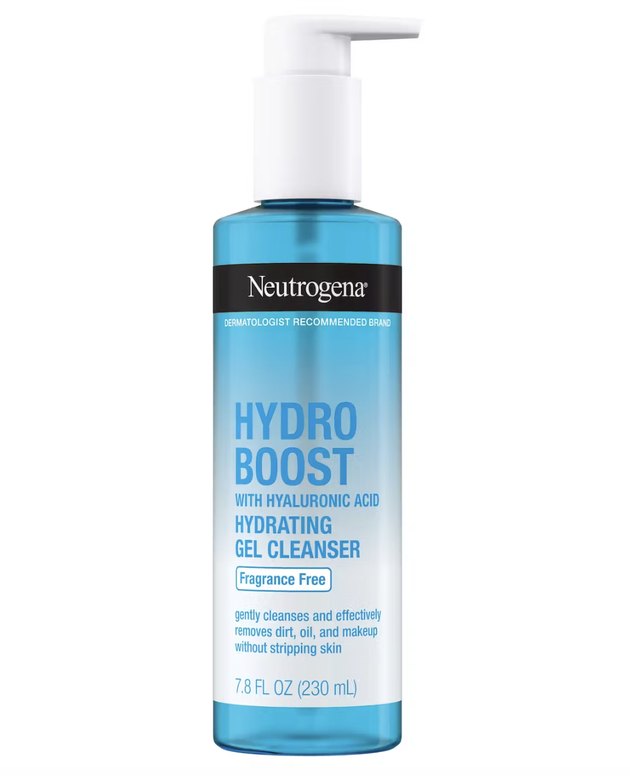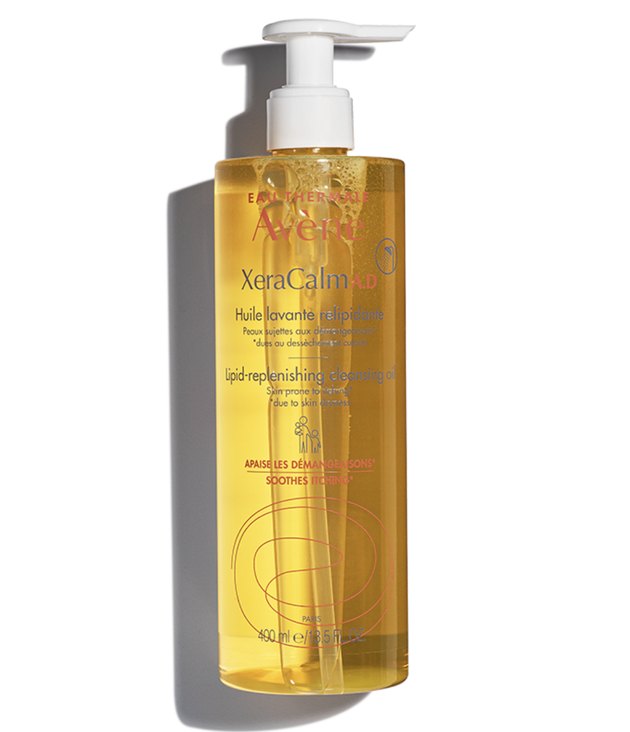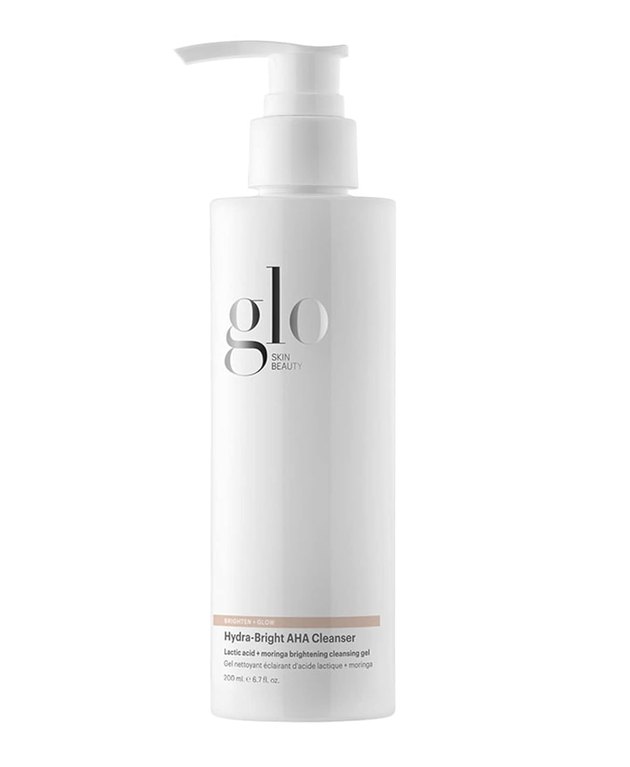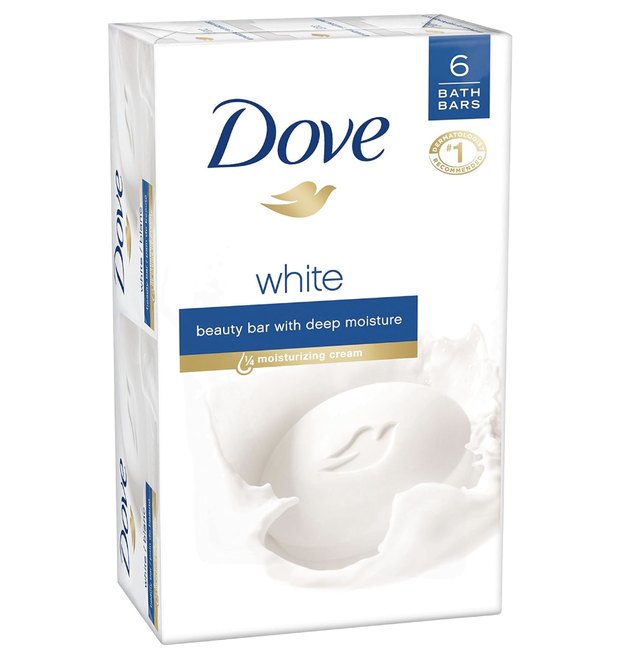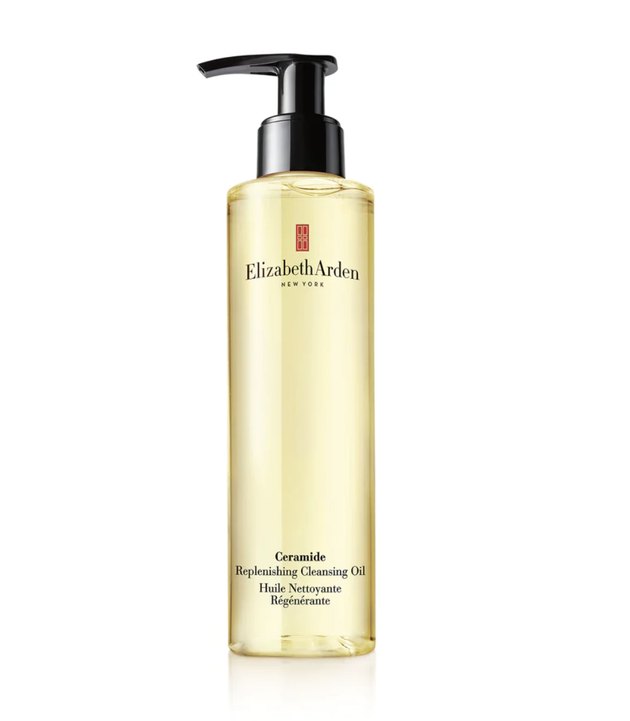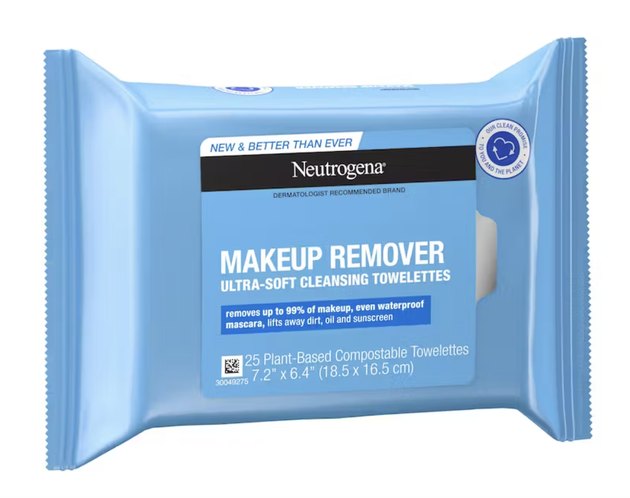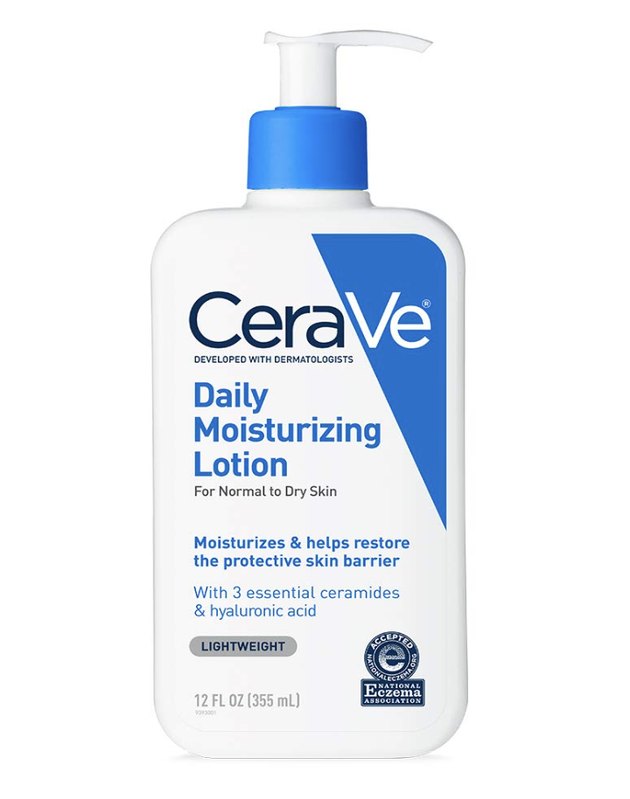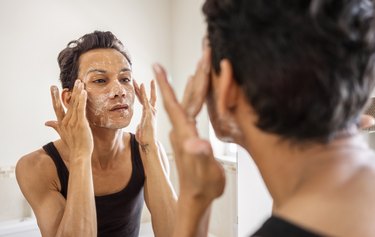
If you strive to make efforts towards taking care of your skin, you're probably quite serious about one of the most important steps in any skin-care routine: cleansing.
This typically involves rinsing your face with a skin-friendly cleanser that's formulated with ingredients to remove makeup, oil, debris, pollutants and other impurities from your skin.
Video of the Day
Video of the Day
"Most dermatologists consider skin cleansing to be paramount to skin health, as it helps prevent these impurities from clogging your pores, leading to acne or even causing free-radical damage that accelerates aging over time," says Dendy Engelman, MD, FACMS, board-certified cosmetic dermatologist and Mohs surgeon at Shafer Clinic in Manhattan.
Dr. Engelman recommends cleansing twice daily — once in the morning to rinse oil, sweat and bacteria that accumulate while you sleep, and once at night to remove makeup or pollutants from the environment.
It may seem simple, but cleansing is not an easy habit to get into — and many people are unknowingly doing more harm than good.
Here, learn the most common skin-cleansing mistakes, according to dermatologists, and how to take better care of the skin on your face.
1. Cleansing Too Often
If you're dealing with bouts of acne or increased oiliness, you might be tempted to wash your skin frequently to get that squeaky-clean feeling.
"But this can lead to an increase in breakouts, oiliness and irritation," Dr. Engelman says.
She recommends cleansing once in the morning and once at night with the only exception being if you have exercised or otherwise need to wash your skin for a specific reason — in which case she says it's fine to do an extra wash.
That evening wash is especially important "because it allows for you to remove makeup, dirt, debris, dead skin cells and anything that has touched your skin during the day," notes Cara Brackman, master esthetician at U Glow Med Spa in Massachusetts.
2. Applying Too Many 'Actives' at Once
Sometimes more is not better — and that's often the case when it comes to certain skin-care ingredients.
This is especially true when it comes to "actives," or ingredients you apply to address specific skin concerns — like retinoids for wrinkles or salicylic acid for acne.
"Although retinoids, vitamin C, acids and scrubs all have their place in a skin-care regimen, using all of them together usually causes more problems than solutions," says Papri Sarkar, MD, a Boston-based dermatologist.
"Using too many "actives" at once or too often can irritate your skin, cause inflammation and lead to breaks in skin's barrier, which can cause sensitivity," Dr. Sarkar adds.
She recommends starting slow with one "active" for at least a month and then adding another if your skin needs or tolerates it.
3. Only Cleansing Once a Day
Just like cleansing too often is a problem, so is not cleansing frequently enough.
"As you walk around throughout the day and touch your face and other surfaces, your skin develops a fine layer of sweat and dirt on it," Dr. Sarkar says. This is why it's best to cleanse in the morning and at night.
"If you're worried about washing because of dry skin, try a face wash that isn't irritating or stripping, like Neutrogena Hydro Boost Hydrating Cleanser or a cleansing oil made for sensitive skin like Avene Eau Thermale XeraCalm AD Lipid Replenishing Cleansing Oil," she adds.
And note: If your skin is really dry, you may try to cleanse just once a day, "but preferably in the evening before applying nighttime skin-care products," Brackman says.
4. Using Cleansers With Abrasive Physical Exfoliants
Exfoliating is an important step in your skin-care routine. It helps slough off dry skin cells, making way for younger and brighter skin cells underneath.
But you don't want your everyday cleanser to be filled with abrasive exfoliants like nut shells, for example, as this can cause micro-injuries on your skin and result in pain, redness and even infection, Dr. Engelman says.
Instead "try to find a cleanser that has soft, tiny and dissolvable pieces (like jojoba beads, for instance) that will be gentler on your skin," she adds.
Dr. Engelman also suggests trying a face cleanser with chemical exfoliants instead of physical exfoliants. This includes alpha-hydroxy acids (AHAs) like glycolic acid, which remove dead skin cells and brighten your complexion without irritation.
One of her favorites is Glo Skin Beauty's Hydra-Bright AHA Cleanser, made with vegan lactic acid for a gentle exfoliating and brightening effect.
Tip
Keep in mind that true exfoliation should really only happen once per week for dry skin, or two to three times per week at most. The rest of the time, it's best to stick with a gel or cream cleanser to wash your face.
5. Washing Your Skin With a Bar of Soap
A bar of soap might be ideal for washing your body, but not your face, which is made up of more sensitive skin cells that require a certain pH to prevent irritation.
"Bars of soap can make your skin's pH more alkaline, which disrupts the skin barrier and leaves it more susceptible to dryness and irritation," says Marisa Garshick, MD, a dermatologist at Medical Dermatology & Cosmetic Surgery in New York.
If you're still set on using bar soap instead of a gel or cream, she recommends opting for Dove's Beauty Bar, which uses gentle ingredients to wash away dirt without drying out your skin. It can also help replenish any moisture loss.
"[This soap] is formulated with 1/4 moisturizing cream which helps to leave the skin feeling soft and nourished," she adds.
6. Shying Away From Using Oil
If you're prone to acne or oily skin, you might be afraid to try a skin cleanser that has oil, let alone a true oil on your face.
But oil cleansers can actually be a very effective first step in removing makeup and pollutants on your skin, Dr. Engelman says.
She likes the double-cleansing method: washing your face using oil or oil-based cleanser, and then following with a gentle gel or cream cleanser.
Her go-to is Elizabeth Arden's Ceramide Replenishing Cleansing Oil. "It breaks down impurities like makeup and pollutants while also nourishing the skin with ceramides," she says.
(Note: If you're still not on board with oil, you can use micellar water to remove makeup, instead.)
7. Not Washing After Being Active
Even if you've washed your face in the morning, your should also wash your face again after you've exercised.
"The easiest way to do this if you're on the go is to wash your face with a wash, and use makeup wipes on your body," Dr. Sarkar says.
"I advise patients to keep makeup wipes, like Neutrogena Makeup Wipes, in their gym bag, locker or car just for these occasions," she adds.
Tip
Makeup wipes are great to use in a pinch, but may not be the best option for everyday use. They can flare up skin issues like rosacea and eczema, and may not be the best if you're prone to back or chest acne. If you have time, try wiping down with a wet towel and then a dry one, and using a salicylic acid spray on acne-prone areas.
8. Forgetting to Moisturize
Remembering to moisturize after cleansing is important, as cleansing can strip away oil and residue from your skin's surface — leaving it dry and tight.
"Applying a moisturizing lotion or cream after showering replaces important oils lost in the cleansing process," says Brendan Camp, MD, a Manhattan-based dermatologist at MDCS Dermatology.
"Ingredients like ceramides, a lipid that normally exists on your skin, help maintain the integrity of the skin barrier," he adds.
A great pick with ceramides is CeraVe Daily Moisturizing Lotion, which can be used on both your face and body.
Is this an emergency? If you are experiencing serious medical symptoms, please see the National Library of Medicine’s list of signs you need emergency medical attention or call 911.
